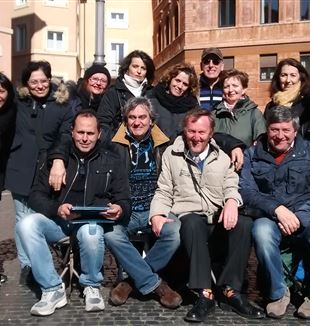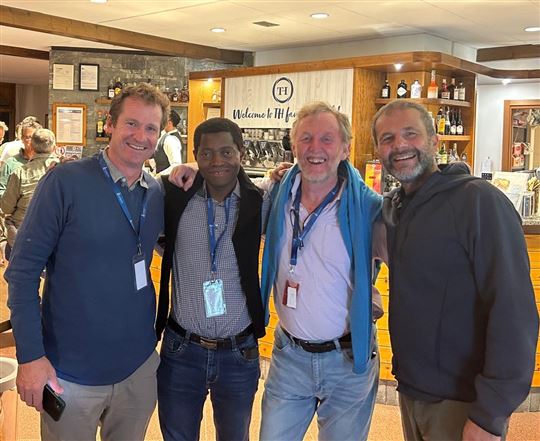
An ordinary story of everday miracles
At the International Assembly of Responsibles held in Italy in August, John Kinder gave a testimony on his encounter with CL and the life of the Movement in Australia. This was part of an evening of testimonies with the theme ‘Mission and presence’.I was born and grew up in New Zealand. My family was Catholic and I loved the church and the faith from always. At university I was involved in Catholic things, including political activism. When I came to Italy for further study, I almost immediately had two incounters that are the shape of my life since then. I met my wife and, quite separately, I met a group of young people in the parish where I lived. I should say, to honour my friends, that this happened in Milan, in Piazzale Corvetto.
This was 1977 and I don’t remember hearing very often the phrase ‘Communion and Liberation’, or perhaps I wasn’t listening, I was simply captivated by the friendship with these new friends. I was looking for theology and political action. They were living, everything, with a passion and an honesty and a realism and a joy I had never seen.
The most surprising thing was that these new friends claimed their friendship was the place where they experienced Jesus. Jesus taught us to pray not ‘My Father’ but ‘Our Father’, he promised to be present wherever two or three are gathered in his name. Encountering Jesus in this friendship – they told me – opens us up to his presence in all places and in all times. They seemed to have no fear, they could embrace all things.
Later, when I realised that my little parish youth group was part of something bigger, something organised, I drew back, suspicious. I wanted to conserve my freedom.
Much later, I stopped resisting and accepted the embrace of the friendship. That was the beginning of my real freedom. But it wasn’t an easy step for me, it happened because of a tragic event in my family. In the days after that event, I found – to my surprise – that I went looking for those friends in the movement though I was still sitting comfortably on the margins. These friends – most of them on the other side of the world – accompanied me with their rich humanity, with fidelity and with unending patience.
The Australian singer Nick Cave says that in his experience it took a devastation for him to abandon the easy position of cynicism and embrace hopefulness. My friend Tom wonders if we all need to be wounded before we can open ourselves to reality – maybe wounded by pain or maybe wounded by beauty.
So our little community was born, 25 years ago. I had already moved to Australia for work, to Perth on the Indian Ocean. Everything began simply, with an invitation distributed to friends and then regular gatherings for School of Community, always in the homes of friends.
Australia, the Great South Land of the Holy Spirit as the early Portuguese explorers called it, is a big country, the world’s largest island. The small population of 25 million live around the coast, the centre is mostly desert. A colleague of mine used to say that Australia has a hole in its heart, she called it a ‘god-shaped hole’. When Pope John Paul II came to Australia in the 1980s, the Tracce magazine published an article that described Australia as the most secularised country on earth. I was rather annoyed, but actually they were right. Multiculturalism became official State policy in 1973 and the most valued civic virtue is tolerance. Which is often not tolerance at all, but indifference. We tolerate difference on condition it makes no demands of me.
Among Catholics – traditionally Irish or Italian in background – the focus is on belonging to a cultural minority. The faith is expressed either in devotional practice or in charitable works. Dualism reigns. Like me, most of my Catholic friends had no faith in their own experience. They thought that if the truth of life ever revealed itself, it could not reveal itself to me in something so insignificant as my own experience. Fr Giussani’s proposal is something new and challenging. And liberating.
The people who make up our community are people attracted through friendship and fascinated by this proposal. The novelty of the proposal became clear to me through a friend who has participated in all our gestures for 25 years. I should say he has also remained faithful to his position of atheism. But early in our time together we had to decide whether to continue reading The Religious Sense or adopt some documents from our diocese, for Lent – our parish priest wanted us to read them. The first person to speak was my atheist friend. He said the diocese texts were trying to explain who God is and why he should believe in God. Fr Giussani, on the other hand, is helping me understand who I am, what my questions are, and why God might be the answer to my questions. He is still officially atheist – ‘God’s times are not our times’.
The other communities in Australia and New Zealand have all grown up like this. Someone meets someone, or someone arrives from somewhere, or someone reads something on the Internet, and then because of a need to live more intensely, a desire not to live uselessly, something happens.
In Perth, my children used to call us a random community, random in the sense that the unity between us seemed to have no reason or justification. In fact, we are extremely different, in every possible way. It would be impossible for us to remain friends for one week, let alone 25 years. It is obvious that the source of our unity is outside ourselves, or perhaps it is better to say it is inside ourselves, but inside our real selves. The fact that we are together, that we are still together, is proof of what Fr Giussani says, that the heart of man is one.
I have no grand gestures to recount. Rather, the history of our community is an uninterrupted story of little miracles. Of people who have decided to enter the Church, or to regularise their marriage or to baptise their children, individuals who have offered their services to their parish or other areas of Christian life. Of new ways of living friendship, or living life together.
For me personally, living the life of this community has been a constant experience of change. My plans for the community have continually failed. Instead, other things have happened – authentic, real and obviously the work of the Spirit. This has been a process of education for me, to learn to decentre, as Pope Francis told us in 2015.
Recently we have encountered young people, who have a new energy and enthusiasm, and make new proposals and requests. This is very useful for me, as at this stage of my life, I have retired from the paid workforce and, even more than before, what I am is more important than what I do. The new proposals from our young friends ask me to have the freedom to accept a new beginning.
A new beginning is possible because this experience of friendship has been a school where I have learned that I am there for a reason. I am in the place where I am, with the people I am with, because Someone has sent me there, has called me to be there. The patience of God was revealed to me in the patience of my friends. So I have come to recognise the God who was waiting to encounter me in them. And I have learned too to allow God to encounter others through me.
The experience continues.